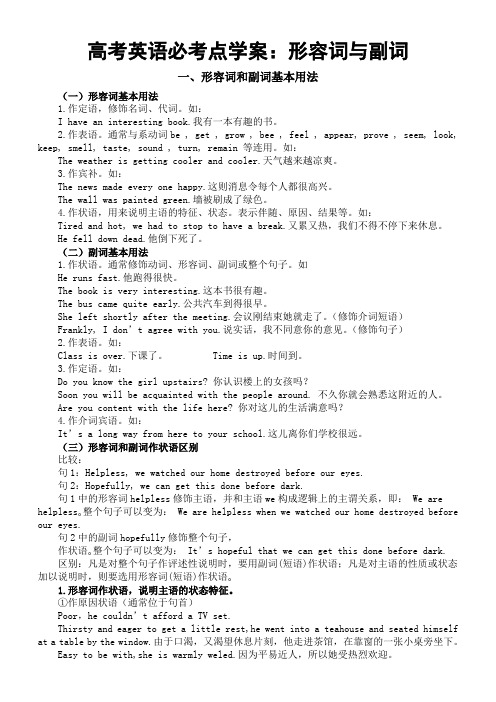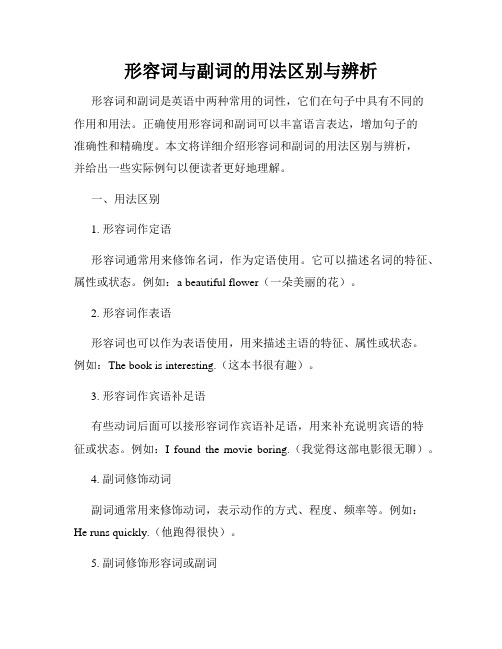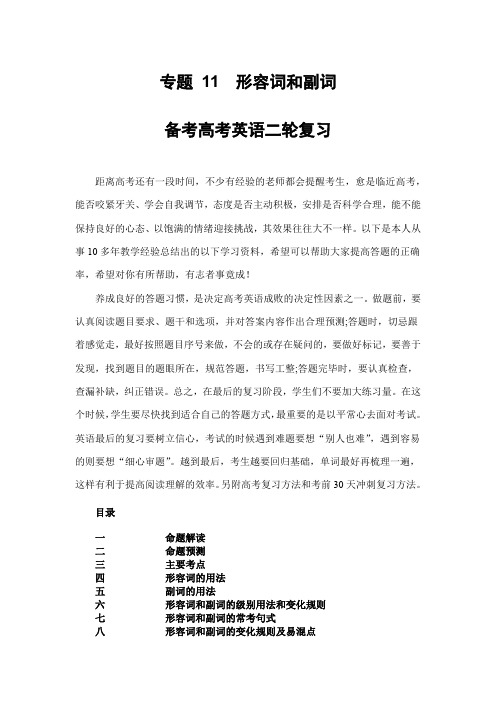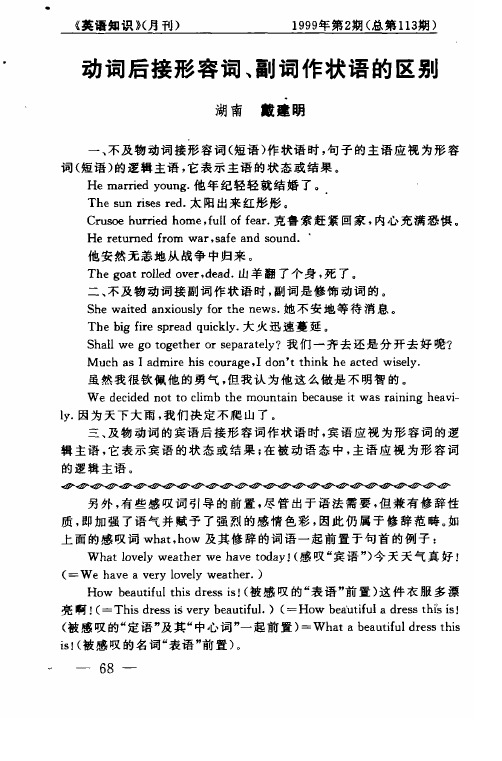副词,形容词作状语的区别
高考英语复习形容词和副词知识点讲解讲义(必考点)

高考英语必考点学案:形容词与副词一、形容词和副词基本用法(一)形容词基本用法1.作定语,修饰名词、代词。
如:I have an interesting book.我有一本有趣的书。
2.作表语。
通常与系动词be , get , grow , bee , feel , appear, prove , seem, look, keep, smell, taste, sound , turn, remain 等连用。
如:The weather is getting cooler and cooler.天气越来越凉爽。
3.作宾补。
如:The news made every one happy.这则消息令每个人都很高兴。
The wall was painted green.墙被刷成了绿色。
4.作状语,用来说明主语的特征、状态。
表示伴随、原因、结果等。
如:Tired and hot, we had to stop to have a break.又累又热,我们不得不停下来休息。
He fell down dead.他倒下死了。
(二)副词基本用法1.作状语。
通常修饰动词、形容词、副词或整个句子。
如He runs fast.他跑得很快。
The book is very interesting.这本书很有趣。
The bus came quite early.公共汽车到得很早。
She left shortly after the meeting.会议刚结束她就走了。
(修饰介词短语)Frankly, I don’t agree with you.说实话,我不同意你的意见。
(修饰句子)2.作表语。
如:Class is over.下课了。
Time is up.时间到。
3.作定语。
如:Do you know the girl upstairs? 你认识楼上的女孩吗?Soon you will be acquainted with the people around. 不久你就会熟悉这附近的人。
形容词与副词的用法区别与辨析

形容词与副词的用法区别与辨析形容词和副词是英语中两种常用的词性,它们在句子中具有不同的作用和用法。
正确使用形容词和副词可以丰富语言表达,增加句子的准确性和精确度。
本文将详细介绍形容词和副词的用法区别与辨析,并给出一些实际例句以便读者更好地理解。
一、用法区别1. 形容词作定语形容词通常用来修饰名词,作为定语使用。
它可以描述名词的特征、属性或状态。
例如:a beautiful flower(一朵美丽的花)。
2. 形容词作表语形容词也可以作为表语使用,用来描述主语的特征、属性或状态。
例如:The book is interesting.(这本书很有趣)。
3. 形容词作宾语补足语有些动词后面可以接形容词作宾语补足语,用来补充说明宾语的特征或状态。
例如:I found the movie boring.(我觉得这部电影很无聊)。
4. 副词修饰动词副词通常用来修饰动词,表示动作的方式、程度、频率等。
例如:He runs quickly.(他跑得很快)。
5. 副词修饰形容词或副词副词也可以用来修饰形容词或副词,表示程度或程度的比较。
例如:She is very beautiful.(她非常漂亮)。
6. 副词作状语副词可以作状语,修饰整个句子或者句子中的某一部分,表示时间、地点、方式、原因、目的等。
例如:He speaks English fluently.(他英语说得很流利)。
二、用法辨析1. 形容词和副词的形式不同形容词和副词的形式有所不同,在大多数情况下,形容词以-y结尾的单词变为副词时,将-y改为-i再加-ly。
例如:happy(形容词)→ happily(副词)。
2. 形容词描述名词,副词描述动词形容词通常用来描述名词,表示名词的性质、状态等;而副词主要用于修饰动词,表示动作的方式、程度、频率等。
3. 形容词有属格和比较级形式,副词没有形容词可以使用属格形式和比较级形式,用来表示所有关系和比较程度。
例如:John's house(约翰的房子)、more beautiful(更美丽)。
超实用高考英语复习:形容词和副词 ---讲练

专题11 形容词和副词备考高考英语二轮复习距离高考还有一段时间,不少有经验的老师都会提醒考生,愈是临近高考,能否咬紧牙关、学会自我调节,态度是否主动积极,安排是否科学合理,能不能保持良好的心态、以饱满的情绪迎接挑战,其效果往往大不一样。
以下是本人从事10多年教学经验总结出的以下学习资料,希望可以帮助大家提高答题的正确率,希望对你有所帮助,有志者事竟成!养成良好的答题习惯,是决定高考英语成败的决定性因素之一。
做题前,要认真阅读题目要求、题干和选项,并对答案内容作出合理预测;答题时,切忌跟着感觉走,最好按照题目序号来做,不会的或存在疑问的,要做好标记,要善于发现,找到题目的题眼所在,规范答题,书写工整;答题完毕时,要认真检查,查漏补缺,纠正错误。
总之,在最后的复习阶段,学生们不要加大练习量。
在这个时候,学生要尽快找到适合自己的答题方式,最重要的是以平常心去面对考试。
英语最后的复习要树立信心,考试的时候遇到难题要想“别人也难”,遇到容易的则要想“细心审题”。
越到最后,考生越要回归基础,单词最好再梳理一遍,这样有利于提高阅读理解的效率。
另附高考复习方法和考前30天冲刺复习方法。
目录一命题解读二命题预测三主要考点四形容词的用法五副词的用法六形容词和副词的级别用法和变化规则七形容词和副词的常考句式八形容词和副词的变化规则及易混点九即时练一练【命题解读】通过研究历年高考真题不难看出,形容词和副词是高考中的必考点。
完形填空主要考察形容词和副词词义辨析;语法填空中对代词的考查以有提示词形式呈现;短文改错中考查名词,形容词,副词之间的变化规律和级别变化。
今年更突出特定语境中的逻辑意思。
【命题预测】预计2023年高考对形容词和副词的考查会更加灵活,以语法填空、短文改错兼顾完形填空的语篇辨析。
命题者会更加注重学生们在特定语言环境中对代词的把握。
【主要热点】1. 形容词和副词的意思和句法功能;2. 名词变形容词,形容词变副词的变化规律3. 原级、比较级、最高级的使用;4. 倍数的表达法;5. 常见形容词、副词的惯用法。
形容词和副词做状语辅导

英语中形容词的状语功能及语义特征形容词作状语具有双重特点,既要说明其逻辑主语的性质或状态,又要说明句子中的谓语动词;可表示时间、原因、条件、方式、强调或伴随状况等意义;形容词作状语,就结构模式来说,分为不带从属连词和带有从属连词二种。
形容词作状语实际上是一种省略结构。
形容词结构既有限定动词词组也没有非限定动词词组作谓语动词。
因此,它既不同于限定分句,也不同于非限定分句。
基本上属于SVO(主-动-补)句型,只是动词不表现出来,主语也通常不表现出来。
形容词作状语时,一般用逗号将其与句子的其余部分分开。
位置也相对灵活,可位于句首、句末或句中。
本文从形容词作状语的结构模式、句法功能、语义特征等方面做一些简单探讨。
一、形容词作状语的结构模式形容词作状语,就结构模式来说,分为不带从属连词和带有从属连词两种。
1.不带从属连词结构(1)单个形容词结构① Curious,we look around for other guests.由于好奇,我们向四面看看还有什么别的客人。
②The hours passed fitfully ,as I lay awake thinking and praying.时间过得断断续续,那晚我时醒时睡,当我醒着时就思考和祈祷。
(2)并列形容词结构①She was an elderly woman, sensible and trustworthy.她是一个明智的、值得信赖的妇女。
②Large or small, all countries are equal.国家无论大小都应一律平等。
③Finally, tired but happy, they took the bus back to school.最后,他们疲惫而又高兴地坐车回到了学校。
(3)形容词词组作状语①Afraid of difficulties, they prefer to take the easy road.他们由于怕困难,宁愿走容易的道路。
形容词副词做状语

形容词副词做状语一般情况下,由副词在句子中作状语,用与润色动词;润色形容词或者副词;或者润色整个句子。
可是对形容词作状语这一征象,很多同学难以理解,实际上,形容词作状语的现象并不少见,该形容词用来讲明主语的状态,常常可以单独或者引起一短语作状语;可以表示原因,或者表时间,表原因。
一、形容词作状语的情况形容词除了常见的在句中作定语、名词性谓语和宾语补足语外,也可像副词同样在句中作状语。
(1)单个形容词结构Overjoyed,he rushed out of the house.(原因)Much interested,he agreed to give it a try.Afraid of difficulties,they prefer to take the easy road.Curious,we look around for other guests.由于好奇,我们向四面看看还有什么别的客人。
Helpless,we watched the house being destroyed before oureyes.Ripe(When ripe),these apples are sweet.(时间)Alone,he would have been terrified.如果单独一个人,他是会感到害怕。
(条件)(2)并列形容词结构He spent 7 days in the wind and snow,cold and hungry.(状态)She was an elderly woman, sensible and trustworthy.她是一个明智的、值得信赖的妇女。
Large or small, all countries are equal.国家无论大小都应一律平等。
Finally, tired but happy, they took the bus back to school.最后,他们疲惫而又高兴地坐车回到了学校。
动词后接形容词、副词作状语的区别

e
d fr o m w a
r
s a
fe
a
n
。
d s o
n
d
.
’
他 安 然 无 恙 地 从 战 争 中归 来
h T
Sh
e
go
t
r l o e d
d
a
o
v e
u s
r
,
d
e a
d 山 羊翻 了 个身 死 T
,
.
,
。
二 不 及 物 动 词 接 副词 作 状 语 时 副 词 是 修 饰 动 词 的
e
、
。
w
e a u s e
it
wa
s
r a
in in g
he
a v
i
-
因 为 天 下 大 雨 我 们决 定 不 爬 山 了
、 ,
三 及 物 动词 的 宾 语 后 接 形 容 词 作 状 语 时 宾 语 应 视 为 形 容 词 的 逻 辑 主 语 它 表 示 宾 语 的状 态 或 结 果 在 被 动 语 态 中 主 语 应 视 为形 容 词 的 逻辑主 语
t
( 被 感 叹 的“ 定 语
及其
“
中心 词
"
一起 前 置 ) =
Wh
a
b
e a u
t
i fu
l d
r e s s
hi s
( I 被 感 叹 的 名 词 “表 语 ”前 置 )
。
一
68
一
h
T P
n
i
i
n
l
u
n
f
i
Pi
。
形容词和副词的区别及其在句子中的修饰作用
形容词和副词的区别及其在句子中的修饰作用形容词和副词是英语中常见的词性,虽然它们在形式上有所差异,但在句子中都扮演着修饰其他词语的作用。
本文将详细介绍形容词和副词的区别,并分析它们在句子中的修饰作用。
一、形容词的定义和特点形容词是一类用来修饰名词或代词的词语。
它通常用来描述事物的性质、特征或状态。
形容词可以直接位于名词前作定语,也可以在句中充当表语或补足语。
例如:1. The beautiful sunset painted the sky with various colors.(美丽的日落给天空涂上了各种颜色。
)2. She seems happy today.(她今天看起来很开心。
)3. This book is interesting.(这本书很有趣。
)形容词的词性特点是它具有三种级别:原级、比较级和最高级。
通过变化词尾或使用比较级和最高级的前缀和后缀,形容词可以表示不同程度的性质或特征。
例如:1. big(大)→ bigger(更大)→ biggest(最大)2. beautiful(美丽)→ more beautiful(更美丽)→ most beauti ful(最美丽)二、副词的定义和特点副词是一类用来修饰动词、形容词、副词、句子或整个句子的词语。
它通常用来表示时间、地点、方式、程度等概念。
副词可以在句中充当状语或修饰词。
例如:1. She quickly finished her homework.(她迅速完成了作业。
)2. The car is parked outside.(车停在外面。
)3. He speaks English fluently.(他英语讲得很流利。
)副词的词性特点是它具有一些特殊的变化形式。
有些副词可以通过在词尾加上-ly来构成,但也有一些副词是无规则变化的。
例如:1. quick(快)→ quickly(迅速地)2. well(好地)→ better(更好地)→ best(最好地)3. fast(快速地)→ faster(更快地)→ fastest(最快地)三、形容词和副词的区别形容词和副词之间主要在于修饰的对象不同。
副词从句和状语从句的区别与运用
副词从句和状语从句的区别与运用副词从句和状语从句是英语语法中常见的两种从句结构。
它们在句子中充当状语成分,用来修饰动词、形容词、副词等,从而表达出时间、原因、目的、条件等不同的语义关系。
本文将详细介绍副词从句和状语从句的区别,并探讨它们在实际运用中的使用方式。
一、副词从句的定义及特点副词从句是由副词引导的从句,可以充当状语,修饰整个句子或句子中的某个成分。
副词从句通常包含一个主语和一个谓语,并且与主句之间存在一定的从属关系。
副词从句可以根据其功能分为时间副词从句、地点副词从句、原因副词从句、目的副词从句、条件副词从句等。
下面将分别介绍这些副词从句的特点及使用方法:1. 时间副词从句:用来表示动作或事件发生的时间,如when(当...时候)、while(当...的时候)、before(在...之前)、after(在...之后)等。
例如:I will call you when I arrive at the airport.(我到机场时会给你打电话。
)2. 地点副词从句:用来表示动作或事件发生的地点,如where(在哪里)、wherever(无论在哪里)、whenever(无论何时)等。
例如:You can go wherever you want.(你可以去你想去的任何地方。
)3. 原因副词从句:用来表示某种原因或理由,如because(因为)、since(既然)、as(由于)等。
例如:He couldn't come to the party because he was sick.(他因为生病不能参加派对。
)4. 目的副词从句:用来表示动作或意图的目的,如so that(以便)、in order that(为了)等。
例如:I brought my umbrella so that I won't get wet in the rain.(我带了伞,以便在雨中不被淋湿。
)5. 条件副词从句:用来表示某一条件下会发生的情况,如if(如果)、unless(除非)、as long as(只要)等。
英语语法:状语从句八大类型的区分以及知识点讲解
英语语法:状语从句八大类型的区分以及知识点讲解NO.1 副词作状语(1)句子副词:句子副词用于修饰句子(而不是修饰某个单个的词),反映说话人的观点和看法。
如actually, apparently, certainly, clearly,definitely, evidently, fortunately, frankly, honestly, luckily, obviously, perhaps, possibly, probably, surely, undoubtedly, unexpectedly 等。
作用以及位置:句子副词通常位于句首(或分句句首)。
Eg:Obviously he can't tell the difference between them. 显然他无法区别两者的不同。
I arrived late but luckily the meeting had been delayed. 我迟到了,幸而会议推迟了。
但有些句子副词也可以出现句中。
eg:He smiled nastily. He evidently knew something I didn't. 他发出狞笑,他显然知道一些我所不知道的事。
有的句子也可用作其他种类的副词,不过这往往会导致位置和语义的变化:Clearly he didn't say so. 显然他没有这样说。
(句子副词)He didn't say so clearly. 他说得没有那么清楚。
(方式副词)(2)起连词作用的副词连接副词就是连接词,如besides,meanwhile,then, therefore, thus, However,Otherwise, so, yet 等。
作用以及位置:常放在两个句子中间,前面为逗号,后面放连接词,从句之前。
注意:so 也可放在形容词之前做修饰,yet 可放句尾或从句之前。
形容词和副词做状语辅导
英语中形容词的状语功能及语义特征形容词作状语具有双重特点,既要说明其逻辑主语的性质或状态,又要说明句子中的谓语动词;可表示时间、原因、条件、方式、强调或伴随状况等意义;形容词作状语,就结构模式来讲,分为不带从属连词和带有从属连词二种。
形容词作状语实际上是一种省略结构。
形容词结构既有限定动词词组也没有非限定动词词组作谓语动词。
因此,它既不同于限定分句,也不同于非限定分句。
大体上属于SVO(主-动-补)句型,只是动词不表现出来,主语也通常不表现出来。
形容词作状语时,一般用逗号将其与句子的其余部份分开。
位置也相对灵活,可位于句首、句末或句中。
本文从形容词作状语的结构模式、句法功能、语义特征等方面做一些简单探讨。
一、形容词作状语的结构模式形容词作状语,就结构模式来讲,分为不带从属连词和带有从属连词两种。
1.不带从属连词结构(1)单个形容词结构①Curious,we look around for other guests.由于好奇,咱们向四面看看还有什么别的客人。
②The hours passed fitfully ,as I lay awake thinking and praying.时间过得断断续续,那晚我时醒时睡,当我醒着时就思考和祈祷。
(2)并列形容词结构①She was an elderly woman, sensible and trustworthy.她是一个明智的、值得信赖的妇女。
②Large or small, all countries are equal.国家无论大小都应一概平等。
③Finally, tired but happy, they took the bus back to school.最后,他们疲惫而又高兴地坐车回到了学校。
(3)形容词词组作状语①Afraid of difficulties, they prefer to take the easy road.他们由于怕困难,宁愿走容易的道路。
- 1、下载文档前请自行甄别文档内容的完整性,平台不提供额外的编辑、内容补充、找答案等附加服务。
- 2、"仅部分预览"的文档,不可在线预览部分如存在完整性等问题,可反馈申请退款(可完整预览的文档不适用该条件!)。
- 3、如文档侵犯您的权益,请联系客服反馈,我们会尽快为您处理(人工客服工作时间:9:00-18:30)。
语.建议你多读英语课本,有意识的分析句子的结构,找出主.谓.宾.相信你的外语会有明明的提高的.简易混淆的形容词和副词形容词用来修饰名词;副词用来修饰动词、形容词、其他副词或整个句子。
可是,有时形容词和副词简易混淆。
例如“Afast train reached the destination fast”中的第一个“fast”是形容词,第二个就是副词。
此外,有些词既能是形容词,也能是副词,有些词义不变,另些词义例外;有些形容词加上后缀“-ly”构成的副词和原来的形容词意思相近,但有一些意义则相差甚远;更有些形容词,除自己本身能兼而充任副词之外,又可以再加上后缀“-ly”构成派生副词,若不小心,简易引起混淆。
下面分别举例说明:⑴可作形容词又可作副词,词义例外如:①a. Joelle is a pretty child.(形容词)b. Tom will be back pretty soon.(副词)②a. The old man has been ill for some time.(形容词)b. Don“t speak ill of others.(副词)⑵既是形容词,也是副词,句子中的语法功能例外,但意义一样,如:③a. What a deep ocean it is !(深的)b. The boy dug deep into the ground.(深)④a. Look at the high mountain!(高的)b. Birds fly high in the sky.(高)⑶形容词可以充任副词,又可以加上后缀,构成派生副词。
在某些场合,两者相近,可以通用(如例⑤和⑥);在另一些场合里,两者意思有异,不可混为一谈(如例⑦和⑧):⑤a. Hold it tight, please!b. Hold it tightly, please!⑥a. Please read slower.b. Please read more slowly.⑦a. John came late yesterday.(迟)b. John has been working hard lately.(最近)⑧a. Jason works hard.(努力地)b. Susan hardly works.(几乎不)⑷有些形容词或副词,同时有多个意思,如:⑨a. Hard labour(苦工)b. Hard times(艰辛时代)⑩a. The baby is fast asleep.(睡得熟)b. Run fast, please!(请快跑)c. Hold the rope fast!(紧握绳索)⑸同词根的派生形容词和形容词及分词间,意思虽甚接近,但简易引起纷乱,如:11a. The child is sleepy.(昏昏欲睡)b. The child is still asleep.(还在睡眠中)c. Why are you looking at the sleeping child?(睡着的)12a. Diana feels lonely/ lonesome in the big house.(感到寂寞)b. Mary was alone in the office last night.(独自)13a. Irene was awake the whole night last night.(整夜未眠)b. Tom had a wakeful night last night.(整夜未眠)c. What did you do during your waking hours last night?(醒着的时刻)一般地说,可以互换的这类词,形容词词形的副词表示比较详尽的概念,经常用语口语中,不太正式;后缀-ly形式的副词,表示比较抽象的概念,有引申义,并有一定感情色彩,变副词比较级时,用此类副词,如修饰动词和分词,放在它们前面。
1) cheap: often used instead of cheaply, esp. in casual conversation and with verbs like buy and sellDo you like this shirt? I bought it really cheaply.cheaplyI can“t sell you more cheaply.2) clean: completely, used with (1) verb forget (2) the proposition over, through(3) adv away outI ~ forget. The ball sailed ~ over the roof.The prisoner got ~ away. I am afraid I am clean out of food.cleanly: precisely in a clean manner, often used with v cut.He caught the ball ~ . The doctor cut ~ through the abdominal wall.3) clear: not touchingPlease stand clear of the gate.clearly: distinctly, obviously, similar to the meaning of clearI can“t see ~ without my glasses.We ~need to think again.4) close: nearCome close, I want to tell you something.closely: carefully, with great attentionStudy this ~ it“s very important.5) dead: exactly completely, used in certain expressions~ right, ~ sure, ` tired,~ slow, ~ ahead, ~ drunk, ~ straightdeadly: fatallyHe was ~ injured in the crash.6) direct: used instead of directly in talking about journeys and timetables The plane goes ~ from London to Houston.7) easy: used in certain expressionsTake it easy. easy come, easy go.Easier said than done.easilyI can do very easily.8) fair: used in the expression play ~, fight ~fairly: justly, honestlyYou must do it ~.9) fine: well, used in some expressionsThat suits me fine. You are doing ~.finely: elaborately (纤细地)(not commonly usedHe studied it very finely.10) free: without paymentYou can“t eat ~ in my restaurant.freely: without limit or restriction(限制)You can“t speak ~ in front of my father.11) hard: to show degreeHe hit hard.hardly: almost not12) high it refers to high position.Don“t go higher. It is dangerous.You must do it justly.14) late: not on timeHe hates arriving late.lately: recentlyI haven“t heard from you lately.15) loud: used instead of loudly in informal conversation with the verbs talk, speak, shout, laughloudly: in a big voiceThey quarreled ~.16) low: in a small voiceCan you speak low?lowly: in a humble wayDon“t speak to him lowly.17) most: veryWhich do you like most?mostly: mainly, most often, in most cases18) pretty: rather~ well, ~ soonprettily: pleasing to people (悦人地)He danced ~.19) quick: in informal English used instead of quickly quicklyHe acted ~.20) real in informal English used instead of reallyreallyAre you ~ tell me the truth.21) right: just, exactly, all the wayThe ball hit me ~ in the nose.He arrived ~ after breakfast.Turn right at the traffic lights.rightly: correctlyright can be used informally instead of rightly You guessed right(ly)22) sharp: punctually准时地He arrived at six o“clock ~.sharply:锐利地,急剧地look ~ speak ~23) short: suddenlyThe car stopped suddenly.shortly: soonHe will come shortly.24) slow used in informal conversation instead of slowlygo ~, drive ~25) sound:彻底地used in the expressionsound asleepsoundly:非常好地He is sleeping soundly.26) straight and straightly used in the same way.27) sure: used in American English meaning certainly surely:He speaks very surely.28) tight: used instead of tightly in informal conversation. hold ~, pack ~.The door was shut ~.tightly: We“d better sit tightly.29)wide: He opened his eyes wide.widely: in many different placesHe has traveled widely.30) wrong used instead of wrongly in informal conversation. You guessed wrong(ly)。
